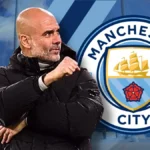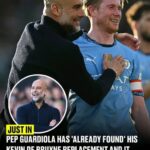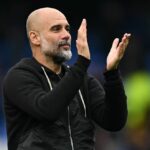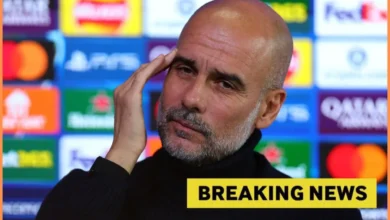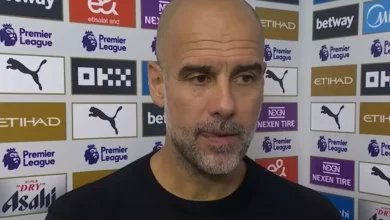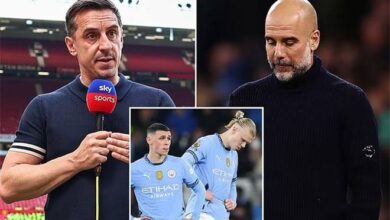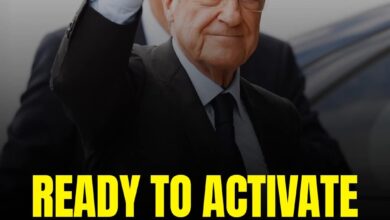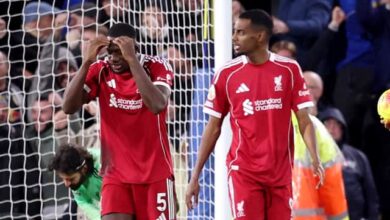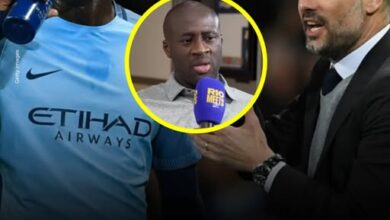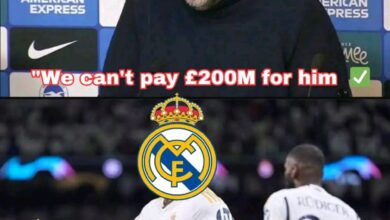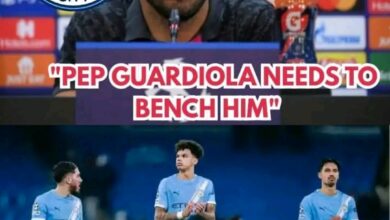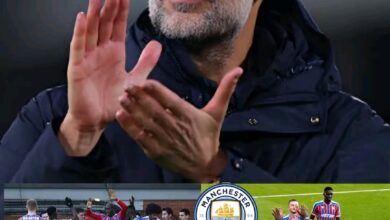Manchester City have now been told how much they will need to pay to sign Florian Wirtz
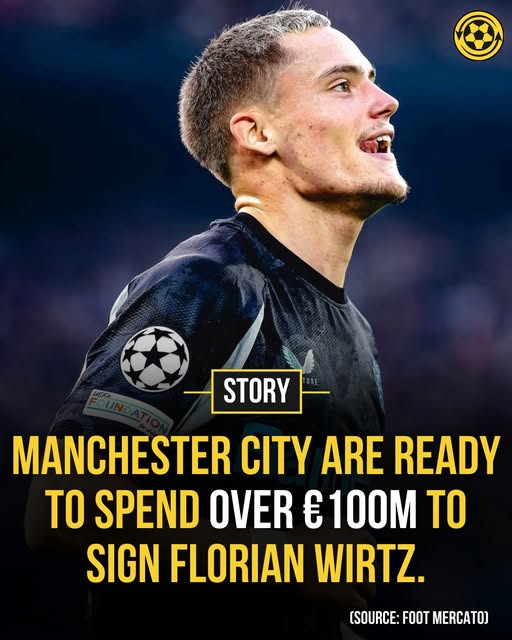
Manchester City’s pursuit of Bayer Leverkusen’s Florian Wirtz has taken a significant turn as the Premier League champions have now been informed of the astronomical fee required to secure the German playmaker’s signature this summer. According to German newspaper BILD, Leverkusen have placed a €150 million price tag on their prized asset, with the fee structure expected to comprise a substantial fixed amount plus performance-related add-ons.
The 22-year-old German international has emerged as City’s primary target to replace the outgoing Kevin De Bruyne, whose decade-long association with the club is drawing to a close following what sources describe as a “brief round of talks” with sporting director Txiki Begiristain and CEO Ferran Soriano. During these discussions, the Belgian midfielder was reportedly informed that the club would not be offering him renewed terms, bringing an end to one of the most successful player-club partnerships in Premier League history.
For City, the pursuit of Wirtz represents not merely a replacement signing but a statement of intent for the club’s next era. The German playmaker has been instrumental in Leverkusen’s recent resurgence under manager Xabi Alonso, displaying the creative vision, technical ability, and goal-scoring prowess that have drawn comparisons to a young De Bruyne. His performances in both the Bundesliga and European competitions have cemented his status as one of football’s most coveted young talents.
However, City’s path to securing Wirtz’s signature is fraught with complications. Bayern Munich appears to hold the advantage in the race, with BILD reporting that Wirtz’s preference would be to remain in Germany with the Bavarian giants. Despite this apparent setback, sources close to Manchester City insist that the club “have not given up yet” and remain determined to present a compelling case to both Leverkusen and the player.
The potential departure of Kevin De Bruyne marks the end of a transformative era at the Etihad Stadium. Since his arrival from Wolfsburg in 2015, the Belgian has been the creative heartbeat of Pep Guardiola’s side, contributing significantly to six Premier League titles, two FA Cups, and the club’s first Champions League triumph. His vision, passing range, and leadership have embodied the stylistic evolution of City under Guardiola.
At 33, De Bruyne remains one of the world’s premier midfielders, but City’s decision not to extend his contract signals a strategic shift toward rejuvenation. This aligns with the broader vision of incoming director of football Hugo Viana, who is reportedly planning “to welcome in a new wave of players as part of the next generation for the club following a difficult season.”
De Bruyne’s exit comes amid persistent rumors linking him with lucrative moves to Saudi Arabia or MLS, with Inter Miami reportedly making a final decision on their interest in the Belgian maestro. Sources suggest that while financial considerations play a role in City’s decision, the club’s commitment to continual evolution – a hallmark of their sustained success – remains the primary driver.
Hugo Viana’s appointment as Manchester City’s new director of football represents a significant behind-the-scenes shift at the Etihad. The former Portuguese international, who made his name in recruitment at Sporting Lisbon, has been tasked with overseeing what amounts to a subtle reset of City’s squad dynamics following what internal sources characterize as “a difficult season” despite securing their fourth consecutive Premier League title.
Viana’s approach appears to center on identifying and securing young talent capable of maintaining City’s competitive edge while gradually phasing out the aging core that has defined their recent dominance. The pursuit of Wirtz exemplifies this strategy – investing significantly in a proven but still developing talent who could form the foundation of City’s midfield for the next decade.
Beyond Wirtz, Viana’s recruitment team is actively exploring multiple options across key positions. Nottingham Forest’s Morgan Gibbs-White has emerged as another midfield target, offering a Premier League-proven alternative should the Wirtz pursuit falter. The 25-year-old English midfielder has impressed with his creative output and adaptability at Forest, suggesting he could provide valuable depth even if Wirtz were to arrive.
The goalkeeper position represents another area of strategic focus for City this summer, with uncertainty surrounding the futures of both Ederson and Stefan Ortega Moreno. Brazilian international Ederson, who has been City’s first-choice goalkeeper since 2017, has been linked with potential moves to Saudi Arabia, prompting the club to explore contingency options.
FC Porto’s Diogo Costa has emerged as a primary target, with the Portuguese international’s ball-playing abilities and commanding presence making him a natural fit for Guardiola’s system. Meanwhile, reports from Italy suggest that Paris Saint-Germain’s Gianluigi Donnarumma could also be under consideration, representing a more experienced but equally high-profile alternative.
The situation remains fluid, with City’s recruitment team adopting a proactive approach by identifying potential replacements regardless of Ederson’s final decision. This forward-thinking strategy reflects the club’s commitment to seamless transitions, ensuring that any departure – even of a player as integral as Ederson – can be absorbed without compromising competitive performance.
The potential departure of key figures like De Bruyne and possibly Ederson necessitates tactical adaptation from Guardiola and his coaching staff. De Bruyne’s unique skill set – combining elite creativity with physical robustness and tactical intelligence – cannot be directly replicated, requiring a more holistic reimagining of City’s midfield dynamics.
Wirtz, should he arrive, would likely assume a slightly different role within City’s system. While sharing De Bruyne’s creative vision, the German operates more effectively in central attacking spaces, potentially signaling a shift toward a more compact attacking structure focused on quick combinations rather than De Bruyne’s trademark sweeping crosses and through balls from wider positions.
Similarly, any change in the goalkeeper position would impact City’s build-up play. Ederson’s exceptional distribution – particularly his ability to bypass opposition presses with accurate long passes – has been foundational to City’s tactical approach. Both Costa and Donnarumma offer strong ball-playing credentials but would require time to fully integrate into City’s complex build-up patterns.
Guardiola’s genius has always been his ability to evolve his tactical approach based on available personnel. The coming transition represents perhaps his greatest challenge yet at City – maintaining competitive excellence while implementing substantive changes to the team’s established core.
## Financial Considerations: Navigating FFP Constraints
Manchester City’s transfer strategy unfolds against the backdrop of ongoing scrutiny regarding Financial Fair Play (FFP) regulations. The club continues to contest the Premier League’s 115 charges relating to alleged financial improprieties, creating a complex environment for high-value transfers.
A potential €150 million outlay for Wirtz would represent one of City’s largest ever investments in a single player, requiring careful financial management to ensure compliance with current regulations. The concurrent departure of high-earning veterans like De Bruyne creates some flexibility in the wage structure, but City’s recruitment team must balance ambitious targets with financial prudence.
The pricing approach for outgoing players also reflects this reality. Reports suggest that City have placed a specific valuation on Kalvin Phillips ahead of his expected departure, seeking to recoup a significant portion of their initial investment despite the midfielder’s limited impact since arriving from Leeds United. Such disciplined asset management has been a hallmark of City’s approach, allowing for strategic reinvestment in priority positions.
City’s transfer strategy is inevitably influenced by the evolving competitive landscape within the Premier League. Arsenal’s continued development under Mikel Arteta, Liverpool’s resurgence under new management, and the ongoing financial might of Chelsea and Manchester United necessitate a proactive approach to squad building.
The targeting of Wirtz and Gibbs-White suggests a specific focus on enhancing creativity and ball progression from midfield positions – areas where rivals have invested significantly in recent windows. Arsenal’s acquisition of Declan Rice and Martin Ødegaard’s continued development, Liverpool’s midfield rebuild centered around Alexis Mac Allister and Dominik Szoboszlai, and Chelsea’s persistent pursuit of top midfield talent all represent competitive challenges that City must address.
City’s strategy appears to prioritize technical quality and tactical intelligence over physical attributes – consistent with Guardiola’s philosophy but potentially responding to the increasingly physical nature of Premier League midfield battles. The ability to control games through technical superiority remains central to City’s competitive approach, even as personnel changes.
Manchester City’s academy continues to produce exceptional talent, with recent years seeing the emergence of Phil Foden, Cole Palmer (now at Chelsea), and Rico Lewis as Premier League-level performers. The club’s transfer strategy increasingly seeks to balance external recruitment with strategic youth integration.
Reports suggest that City are monitoring Claudio Echeverri’s development closely, with Julian Alvarez and Guardiola himself reportedly providing guidance to the young Argentine ahead of his potential integration into the first-team environment. This blended approach – combining strategic external recruitment with calculated youth promotion – aims to ensure both immediate competitiveness and long-term sustainability.
The academy pathway remains a crucial component of City’s overall strategy, providing both homegrown talent for the first team and valuable assets for potential transfer market operations. The success of former academy players like Palmer at rival clubs has reinforced the quality of City’s youth development program, even as it highlights the challenges of retention amid competition for playing time.
Manchester City’s global scouting infrastructure represents one of the club’s most significant competitive advantages, allowing for early identification of emerging talent across multiple markets. This network continues to evolve under Viana’s leadership, with increased focus on identifying players whose technical and tactical profiles align with Guardiola’s requirements.
The pursuit of Wirtz exemplifies this approach – identifying a player whose developmental trajectory suggests the potential to excel specifically within City’s system. Similarly, interest in Portugal’s Diogo Costa reflects the club’s comprehensive monitoring of the Portuguese market, where Viana’s connections and expertise provide additional insights.
Beyond Europe’s traditional powerhouse leagues, City’s scouting focus increasingly extends to emerging markets in South America, North America, and Asia, seeking to identify talents before they reach the radar of other elite European clubs. This proactive, global approach to talent identification provides City with options across multiple price points and development stages.
Pep Guardiola’s contract situation inevitably influences City’s recruitment planning. The Catalan manager’s current deal expires in 2025, creating uncertainty about the club’s longer-term tactical direction. However, rather than constraining recruitment, this timeline appears to be accelerating City’s regeneration plans.
The pursuit of Wirtz and other young talents suggests a strategy focused on assembling a squad capable of thriving both under Guardiola’s current leadership and beyond his potential departure. Players with tactical intelligence, technical excellence, and positional versatility represent priorities – attributes valued by Guardiola but transferable to various tactical approaches should a managerial change occur.
Guardiola himself remains actively involved in recruitment decisions, as evidenced by his reported conversations with Bruno Guimaraes as City extend their search for De Bruyne’s replacement. His influence ensures tactical cohesion between recruitment and implementation, maintaining alignment between boardroom strategy and training ground application.
Manchester City’s approach to the upcoming transfer window reflects the balanced philosophy that has underpinned their sustained success – ambitious but calculated, forward-thinking yet pragmatic. The pursuit of Florian Wirtz represents both the scale of their ambition and the strategic focus of their planning, targeting a generational talent capable of defining their next competitive cycle.
Whether City ultimately secure Wirtz’s signature or pivot to alternative targets, the broader strategy remains clear: a measured evolution rather than revolution, gradually refreshing an aging core while maintaining the tactical principles and competitive standards that have defined the Guardiola era. With Viana now directing recruitment operations and key positions identified for reinforcement, City’s summer promises significant movement despite the constraints of financial regulations and competing interests.
As De Bruyne’s remarkable chapter potentially closes, City’s pursuit of Wirtz symbolizes the club’s unwavering commitment to excellence and innovation – not merely replacing what was but reimagining what could be. The €150 million price tag represents not just the cost of an exceptional young player but an investment in Manchester City’s continued presence at football’s elite level for years to come.

